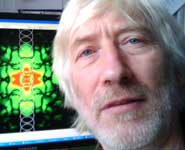These awards are made under a Europe-wide scheme that supports exceptional, professorial-level research leaders in undertaking groundbreaking, high-impact research projects. Three ERC Advanced Grants are to be awarded to the following three Bristol researchers:
Professor Varinder Aggarwal in the School of Chemistry for his project 'Revolutionising organic synthesis: efficient one-pot synthesis of complex organic molecules for non-experts'.
Organic synthesis involves the piecing together of smaller organic building blocks to create a specific molecule. In order for these building blocks to bond, their ends have to be activated in some way to make them attracted to each other. However, as the molecule increases in size and complexity it becomes increasingly difficult to target the activation accurately; other sites also get activated, creating a mixture of wanted and unwanted compounds. The desired molecule then has to be extracted from this mixture before the process can continue. Professor Aggarwal and his team, funded by the EPSRC, have developed a method of activating particular building blocks with complete selectivity for a particular site, to create a product ready-primed for reaction with the next building block without the need for further activation. The ERC grant funds work on the development of this technology, which could open up the scientific discipline of organic synthesis to a much broader pool of scientists, with tremendous potential for applications in medicine, agriculture, communications, and countless other fields.
Professor Ian Manners in the School of Chemistry for his project 'Functional nanomaterials via controlled block copolymer assembly'.
Block copolymers are large molecules in which two polymers are joined together. When these materials are dissolved in a solvent that is well suited to one block but not the other, core-shell structures called micelles are formed. Professor Manners’ team has recently shown that if the core-forming block is crystalline, then stable cylindrical micelles with controlled length and segmented architectures can be formed. This potentially opens the door to a fundamentally new approach to nanoelectronic devices and liquid crystal displays. The ERC grant supports a five-year fundamental research programme that aims to develop this exciting new area.
Professor John Rarity in the Department of Electrical and Electronic Engineering for his project ‘Quantum optics in wavelength scale structures’.
The aim of the project is to trap light in cavities as small as one cubic wavelength. Within these cavities one can expect to enhance drastically the interactions between the light and matter. This will lead to a new family of devices with unprecedented performance in the storage of data, the switching of light and the generation of light with tailored properties.


